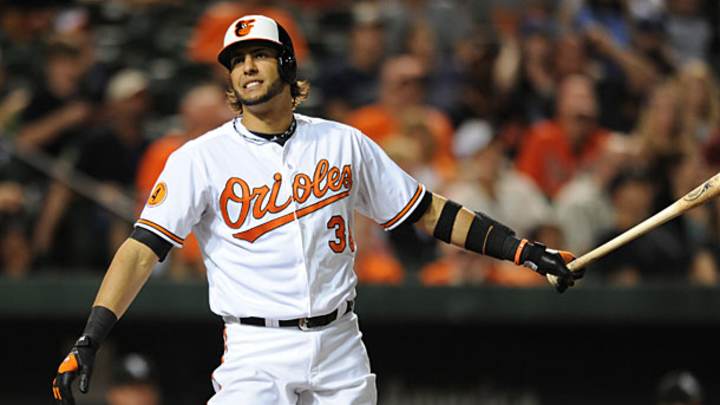Morse's one-year deal with Giants a bigger risk for him than the team

Michael Morse hit just .103 after a late-season trade to the Orioles in 2013. (Gail Burton/AP)

Michael Morse has come to terms with the San Francisco Giants on a one-year contract worth $6 million, a deal that's a better bet for the team than for the player. For the Giants, who were prepared to enter the 2014 season with Gregor Blanco as the strong-side of a platoon in rightfield, the righthanded Morse is an upside play who, at worst, should fit the bill as Blanco's platoon partner. At best, Morse, who hit .296/.345/.516 while averaging 30 home runs and 93 RBIs per 162 games played with the Nationals from 2010 to 2012, will take over leftfield full-time and provide a welcome source of power for a team that had just one player top 20 home runs in 2013.
For Morse, however, the move to the offense-suppressing AT&T Park could mask his value even if he does bounce back from his disappointing, injury-plagued 2013 season. Hampered by quadriceps and wrist injuries (he had a bone spur removed from his left wrist in October), Morse hit a mere .215/.270/.381 with 13 home runs in 337 at-bats for the Mariners and Orioles this past season. As a result, he has accepted a pay cut from San Francisco (he made $6.75 million last year in his final year of arbitration coming off those three strong seasons for Washington) in the hope of boosting his price by next winter. However, if Morse's primary goal with his new contract was to improve his numbers, he chose one of the worst ballparks in baseball in which to do it.
According to the park factors in the 2014 Bill James Handbook, only Marlins Park (which opened in 2012) was harder than AT&T Park to hit a home run in over the last three seasons. The Giants' home stadium is a bit easier on righties than lefties when it comes to home runs, but the James Handbook still lists its righthanded home run factor as 82 relative to an average score of 100. That's the wrong place for a player like Morse -- who derives a great deal of his value from home runs -- to get well.
That doesn't necessarily mean he's a bad investment for the Giants. As a righthanded power source, Morse is a nice compliment to the lefthanded Blanco, whose game is based around speed and defense. In addition, Morse can also play first base, where he will occasionally spell lefty Brandon Belt, and he will be the team's best pinch-hitter on days that he doesn't start. At $6 million, Morse is earning what, in free agency, is now a part-time salary but with half the commitment; already this offseason the Indians have signed David Murphy to a two-year, $12 million deal and the Tigers signed Rajai Davis for two years and $10 million to be backups.
